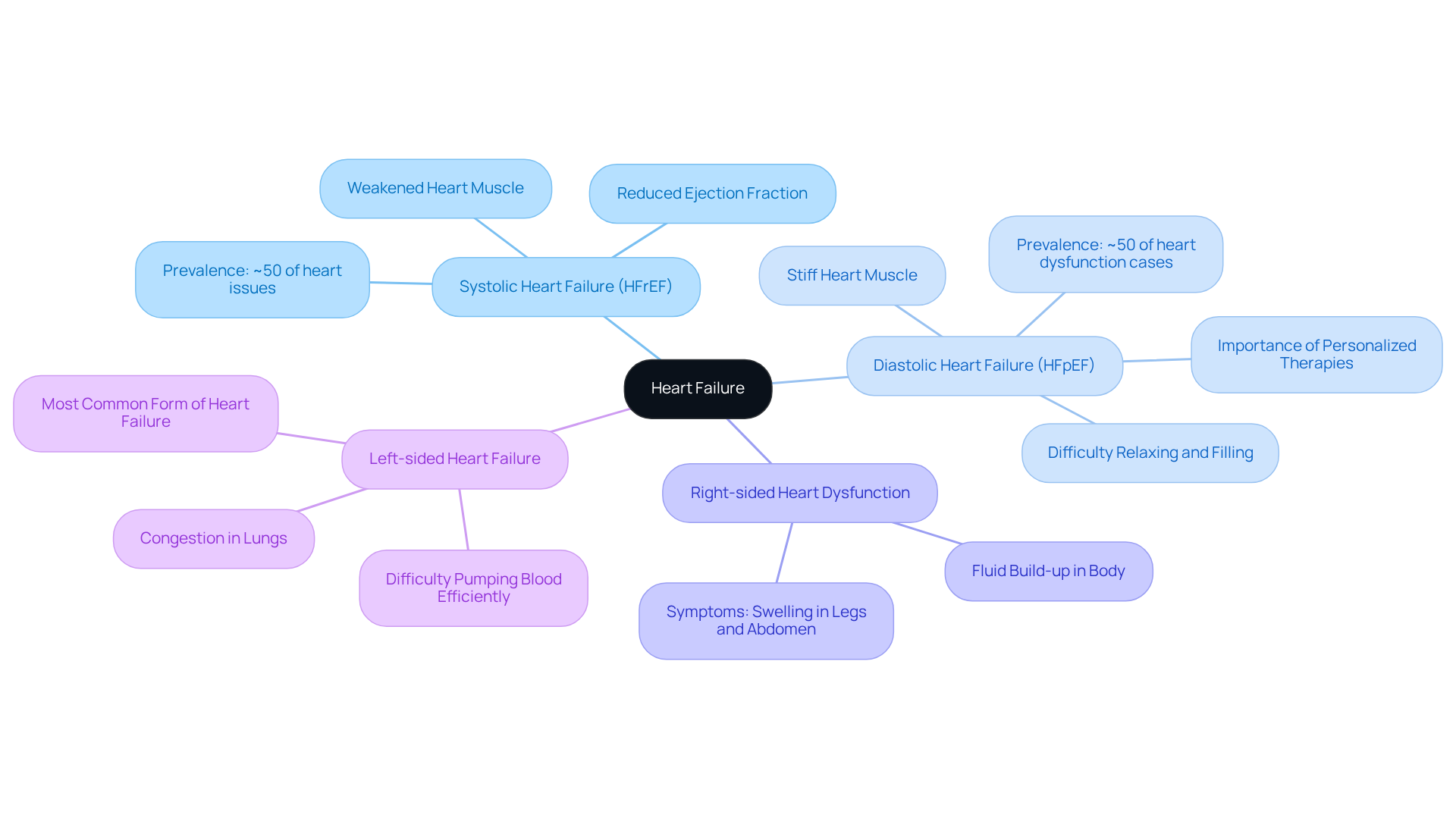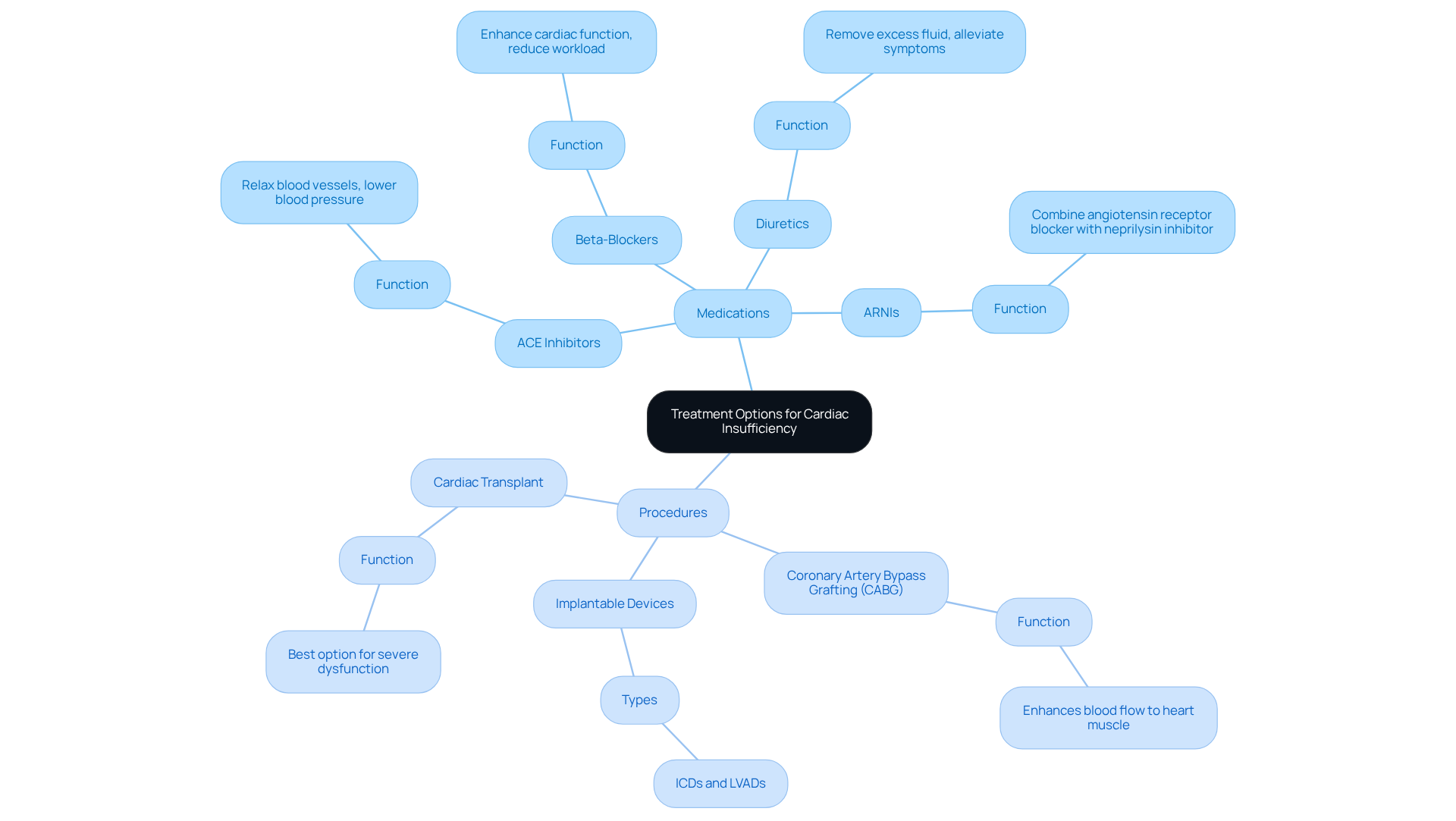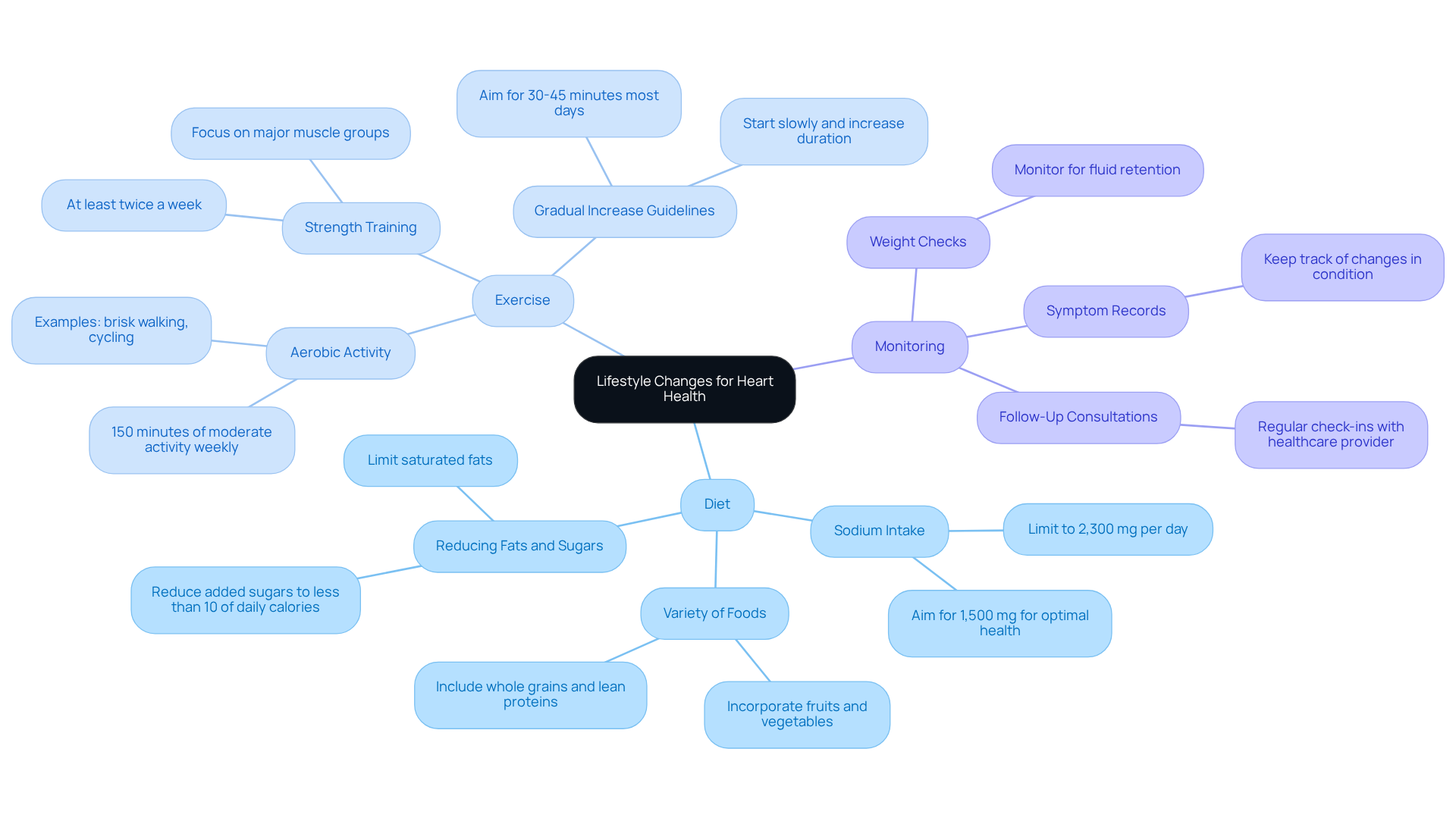


Managing heart failure can feel overwhelming, but there is hope. Through a thoughtful combination of medications, lifestyle changes, and ongoing care, tailored to your unique needs, you can take control of your health. It's important to understand the various types of heart failure and how personalized treatment strategies can make a difference.
Have you considered how medication adherence, dietary adjustments, and regular exercise can enhance your quality of life? Consistent follow-up with your healthcare providers is essential, as it ensures that your treatment plan is effective and supportive. Remember, you are not alone on this journey.
In addition to these strategies, think about how small changes can lead to significant improvements in your health. Each step you take towards better management of your heart failure can lead to a brighter future. Your well-being is our priority, and we are here to support you every step of the way.
If you have any concerns or questions, please reach out. Together, we can work towards enhancing your health and ensuring a fulfilling life.
Understanding heart failure can feel overwhelming, especially as its prevalence continues to rise. Millions are projected to be affected in the coming years, and it's natural to have concerns about this condition. This article explores effective management strategies, including the different types of heart failure, treatment options, and essential lifestyle changes that can significantly enhance your cardiac health.
But with so many options available, how can you navigate your unique treatment path? It’s important to ensure that you are making the best choices for your heart health. In addition to this, there are ways to approach your care that can make a significant difference. We aim to provide you with the knowledge and support needed to feel empowered in your health journey.
Cardiac insufficiency, often referred to as congestive heart failure (CHF), can be concerning when the heart struggles to pump enough blood to meet the body's needs. Understanding the different types of cardiac insufficiency is vital for effective management and care.
Systolic Heart Failure (HFrEF): This type is characterized by a weakened heart muscle that does not contract effectively, leading to a reduced ejection fraction. It's important to note that nearly 50% of individuals with heart issues experience this form.
Diastolic Heart Failure (HFpEF): In this condition, the heart muscle becomes stiff, making it difficult for the heart to relax and fill with blood. HFpEF accounts for about 50% of heart dysfunction cases, highlighting the need for targeted treatment strategies. Cardiologists emphasize that personalized therapies, including lifestyle changes and medications, can greatly enhance patient outcomes.
Right-sided Heart Dysfunction: Often stemming from left-sided dysfunction, this type results in fluid build-up in the body, leading to symptoms like swelling in the legs and abdomen.
Left-sided Heart Failure: This is the most common form, where the left ventricle has difficulty pumping blood efficiently, causing congestion in the lungs and various complications.
Recognizing these categories is essential for understanding how to treat heart failure and the specific symptoms and treatment approaches necessary for effective cardiac care. Symptoms such as shortness of breath and fatigue during daily activities may indicate underlying cardiovascular issues, including valve disease. At Amavita Heart and Vascular Health, Dr. Martinez-Clark specializes in minimally invasive valve treatments that can repair or replace damaged valves, significantly improving breathing and energy levels.
As cardiac dysfunction continues to rise, with projections suggesting that 11.4 million individuals will be affected by 2050, addressing these challenges with appropriate measures is more crucial than ever. In 2021, cardiac dysfunction was linked to 425,147 fatalities, accounting for 45% of cardiovascular deaths, underscoring the importance of effective management strategies. Furthermore, the lifetime risk of developing cardiac issues has climbed to 24%, reflecting a growing public health concern. Amavita's CardioElite™ program offers comprehensive cardiovascular management, integrating advanced diagnostic insights and proactive care to enhance outcomes and reduce readmissions.

Managing cardiac insufficiency can feel overwhelming, but a comprehensive strategy tailored to your unique needs can make a significant difference. It’s essential to understand how to treat heart failure, including the options available that consist of both medications and procedures designed to support your heart health.
Sometimes, surgical interventions may be necessary to learn how to treat heart failure and support heart function. Here are a few options:
It’s vital to have a conversation with your healthcare provider to discuss how to treat heart failure and determine the most suitable treatment strategy for you. This ensures that your individual situation and overall well-being are taken into account. Remember, you are not alone in this journey; support is available to help you navigate your options.

Implementing lifestyle changes can significantly enhance heart health and is an important aspect of how to treat heart failure symptoms effectively.
Diet: Emphasizing a heart-healthy diet is crucial. Consider incorporating:
Exercise: Consistent physical activity is vital for managing cardiac issues. Aim for:
Monitoring: Keeping track of your health is important. You can do this by:
Along with these lifestyle changes, Amavita provides extensive and ideal programs aimed at advanced cardiovascular monitoring and longevity. These programs encompass services like extensive biomarker panels, cardiac evaluations, and tailored consultations, which can greatly improve the management of cardiac insufficiency. By combining these professional services with lifestyle modifications, you can discover how to treat heart failure and enhance your overall cardiovascular wellness. Remember, you are not alone on this journey; support is available to help you every step of the way.

Effective management of heart failure involves understanding how to treat heart failure through continuous care and regular follow-up appointments.
Regular Check-Ups: It’s important to schedule consistent appointments with your cardiologist to assess heart function and adjust medications as needed. Prompt follow-up is essential; research indicates that nearly 40% of acute myocardial infarction (AMI) patients and over 50% of those with cardiac dysfunction do not receive follow-up care from a cardiology specialist, which can hinder recovery.
Symptom Monitoring: Stay vigilant for any worsening symptoms, such as increased shortness of breath, swelling, or fatigue. Quickly informing your healthcare provider about these changes can lead to timely interventions, which are crucial for maintaining well-being and preventing complications.
Education: Equip yourself with knowledge about how to treat heart failure, focusing on the importance of medication adherence and lifestyle changes. Participating in educational programs can significantly enhance your ability to manage cardiac issues effectively, as informed patients are better prepared to navigate their health challenges.
By actively participating in your treatment and fostering open communication with your medical team, you can greatly enhance your quality of life and understand how to treat heart failure effectively. The Heart Failure Society of America underscores the importance of collaborative care models that empower patients and improve health outcomes, highlighting the need for a patient-centered approach in heart failure management.

Understanding and managing heart failure is a multifaceted journey that requires awareness of its types, treatment options, and the significance of lifestyle changes. Effective management involves not only recognizing the various forms of cardiac insufficiency but also implementing a personalized strategy that includes medications, surgical interventions, and meaningful lifestyle adjustments.
In this article, we explore vital insights into heart failure, highlighting the distinction between systolic and diastolic heart failure. We discuss the role of essential medications like ACE inhibitors and beta-blockers, as well as the necessity of lifestyle changes such as a balanced diet and regular exercise. Regular monitoring and follow-up care are emphasized as crucial components for maintaining optimal heart health and preventing complications. As the prevalence of heart failure continues to rise, understanding these management steps becomes increasingly important for improving patient outcomes and enhancing quality of life.
In conclusion, addressing heart failure requires a comprehensive approach that combines medical treatment with proactive lifestyle adjustments. Patients are encouraged to engage actively with their healthcare providers, participate in educational programs, and seek supportive networks to navigate their journey effectively. By prioritizing heart health and adhering to management strategies, individuals can significantly enhance their well-being and mitigate the impacts of heart failure on their lives. Remember, you are not alone in this journey, and there is a community ready to support you.
What is heart failure and why is it a concern?
Heart failure, often referred to as congestive heart failure (CHF), occurs when the heart struggles to pump enough blood to meet the body's needs, which can be concerning for overall health.
What are the main types of heart failure?
The main types of heart failure include:
What symptoms may indicate underlying cardiovascular issues?
Symptoms such as shortness of breath and fatigue during daily activities may indicate underlying cardiovascular issues, including valve disease.
How significant is the prevalence of cardiac dysfunction?
Cardiac dysfunction is on the rise, with projections suggesting that 11.4 million individuals will be affected by 2050. In 2021, it was linked to 425,147 fatalities, accounting for 45% of cardiovascular deaths.
What is the lifetime risk of developing cardiac issues?
The lifetime risk of developing cardiac issues has climbed to 24%, indicating a growing public health concern.
What treatment options are available for heart failure?
Treatment options include personalized therapies, lifestyle changes, and medications. Specific interventions may involve minimally invasive valve treatments to repair or replace damaged valves, which can significantly improve symptoms like breathing and energy levels.
What is Amavita's CardioElite™ program?
Amavita's CardioElite™ program offers comprehensive cardiovascular management, integrating advanced diagnostic insights and proactive care to enhance patient outcomes and reduce readmissions.